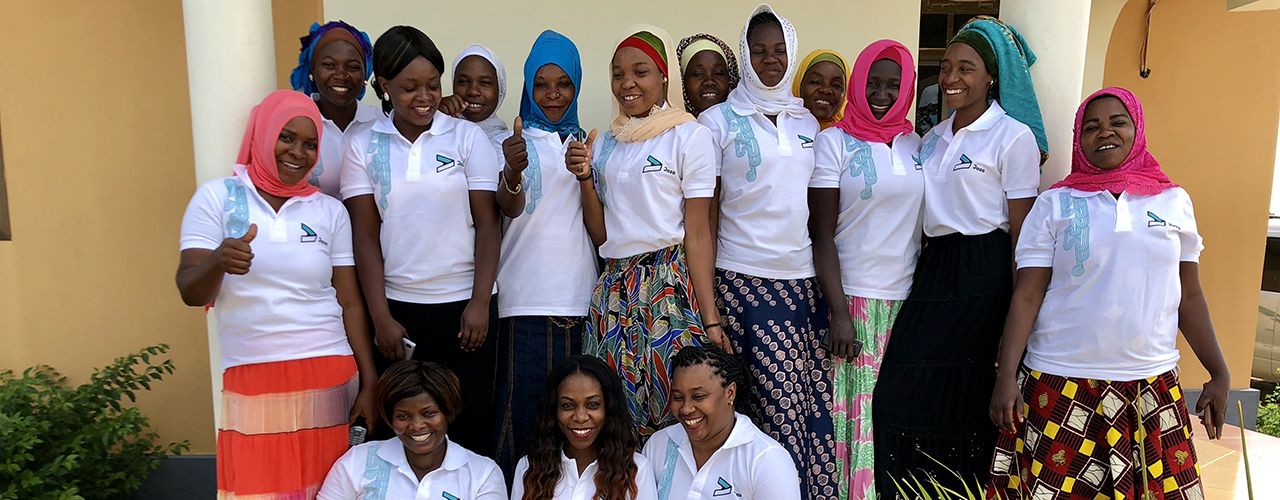
The second session of EEP Africa Knowledge Week 2021 highlighted the importance of leadership and the need to Build an Inclusive Energy Transition.
This virtual event on 23 November showcased the work that Jaza Energy is doing to promote opportunities for young women in Tanzania, followed by a discussion with the 2021 EEP Africa Rising Energy Leaders.
The clean energy transition is playing an important role in society and furthering sustainable economic growth. A just transition requires deliberate efforts to ensure inclusivity, equity, and a human-centred approach to innovation. Women, youth, and local entrepreneurs can enact real change in their communities and act as the drivers of economic and social growth.
EEP Africa has partnered with the World Energy Council on the new series Humanising Energy, which was launched at World Energy Week and is produced by BBC StoryWorks Commercial Productions. This global series explores the innovations, people, and communities behind the global energy transition. Jaza Energy is featured in the film The Women Behind Energy Alternatives in Tanzania.
The session began with a discussion about the film, which showcases the impact of Jaza’s business model and services on lives and livelihoods in Kigoma, Tanzania. Jaza is bringing affordable energy access to low-income communities through women-operated solar hubs and battery rentals. The video follows the story of Jaza Star Raheli and her customer Fabian, who uses the Jaza pack to power his small barbershop.
Mark Gavhure, one of the series’ Creative Leads at BBC Storyworks, discussed the process of creating the film and the key messages that the series hoped to convey to the audience. Over 100 submissions were received but only 20 stories were selected for the series. The goal was to find human stories on the ground that would put the big picture into context and remind us why are we trying to build a better future.
What was really important was to show that the energy transition doesn’t have to be something that’s happening to us - that communities and individuals can be stakeholders. In Raheli, we found a shining example of where a member of the community is taking the energy transition into their own hands and powerfully defeating misconceptions, like women working in the community. Raheli is an example that also challenges other companies and players in the space to think about inclusion, think about financing these kinds of projects, and facilitating more diversity at the grassroots level as well.
Cindy Bavo, Director of People and Culture at Jaza Energy, agreed that Raheli’s journey is a powerful story that deserves to be told. She emphasised that the company has a very intentional strategy to employ local women and provide them with the skills needed to manage the technology, finances and customers. Jaza aims to empower women not just by offering income-earning opportunities, but by helping them believe in themselves and enact sustainable change in their communities.
We came in with the thought ‘Who uses energy the most?’, ‘Who knows about the household’s energy needs?’ A rural woman knows when her kids need to study, when food needs to be cooked – she is the one who is responsible for it. Having a Jaza Star, who is a woman, running the `{`solar energy`}` hub and serving the community was very intentional on our part.
The second half of the session turned the attention to the new EEP Africa Rising Energy Leaders. The five awardees for 2021 are working in a variety roles and countries within the clean energy sector. After briefly sharing their own career paths, they discussed the challenges and opportunities faced by young people in Africa and how companies and investors can better support inclusion through jobs, training, partnerships and financing. In a poll conducted during the session, the audience identified cultural barriers (42%) and insufficient financing for entrepreneurs (35%) are the two biggest barriers for women and youth employment in the energy sector.
The full session can be viewed in the recording, the presentation can be downloaded here, and highlights from the Rising Energy Leader discussion are included below.
Admore Chiumia, Founder of Green Impact Technologies (GIT), highlighted the importance of youth in the energy transition. “Young leaders like us need to step up and lead the way in sustainable energy solutions.”’
Aman Baboolal, Head of Partnerships at Plentify, emphasised his motivation to begin a career in clean energy. “Energy issues are a big problem for people and business in Africa. I wanted to contribute with solutions for clean energy.”
Madrin Maina, Technical Operations Manager – East Africa for Sistema.bio, spoke about the challenges for women in the sector. “Getting recognition in the male-dominated STEM sector is a challenge for women. My tips: make a strong pitch and let it talk for itself.” Madrin also noted the impact that the sector’s work can have on people lives: “Solar energy has had a mind-blowing impact on people’s lives in rural Africa.”
Tracy Kimathi, Founder of Tree_Sea.mals, provided guidance for starting out as a woman entrepreneur. “Ideation stages are very difficult… it seems that you are working on a vision rather than a proven concept. During this time, I concentrated as much time as possible on validating my vision by conducting research, development, and consumer engagement studies that showed our knowledge. By validating the need for productive energy facilities within target communities and setting out pilots, we become known in the industry and had some facts to back us up.”
Ziwa Hillington, Managing Director at Green Bio Energy, spoke about the reasons behind his choice to enter the clean cooking sector. “Clean cooking energy solutions have improved the quality of life of many women.’
This session was moderated by EEP Africa Portfolio Coordinator Faith Chege.
EEP Africa Knowledge Week is an annual series of events that examine evolving themes and innovative projects in the clean energy sector in Africa. The event in 2021 included sessions on financing, leadership, and the agriculture-energy nexus, including cold chain and agro-processing.


